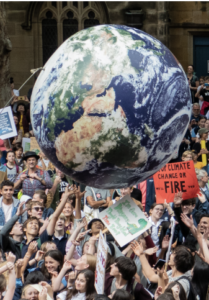News . Best Practices Global Warming and Chemical Pollution

This good practice presents an open school education initiative for the co-teaching of pollution in Biology and Chemistry courses within the Horizon 2020 Research and Innovation Program, No 872814, developed at Neas Alikarnassos High School in the 2021-2022 school year by the teachers of Penelope Charalambidou and Giakoumaki Kondylia from (1/2022 to 4/2022). Four scientists participated in the activities: Nikolaos Kalyvitis, who works at the Laboratory of Environmental Chemical Processes of the Department of Chemistry at the University of Crete, responsible for the Research and Innovation Hub of the University of Crete in Foinokalia Lasithi, Michael Fourgialakis, Msc Biologist and Antoniadis Danai, Marine Biologist who work at ELKETHE and Georgiou Maria, Chemical Engineer Msc who works at the Unified Waste Management Association of Crete (ESDAK). Supported by Toubaniaris Panagiotis, Physicist. This practice was previously presented on the connect platform:
• Care: The students recognized the environmental problems that arise from human-made activities in shaping the climate, and in particular dealt with the factors that cause global warming and chemical pollution. In this phase, parents raised awareness together with their children about climate change, recognized the extent of chemical pollution and chose together the environmental issues that would be interesting to work with. We also created a padlet entitled “You can too to save the planet!” where we invited students to write down their thoughts on climate change or formulate a slogan for the good of the planet. The students who participated in the activities were 23 3rd grade high school students.
• Know: The students used knowledge from unvalidated scientific sources for environmental problems and then talked with special experts on chemical pollution of the air, water table, and the surface of the Earth and asked their questions based on the scientific data they presented. The modern teaching approaches that were used for the scenario were: the inquiry learning method that introduces scientific research into school practice, the experiential method, the cooperative teaching and the problem-solving method (Kalathaki, 2015). , discussing claims and evidence, drawing conclusions and composing group assignments.
• Do: At the end, students:
◦ calculated their ecological footprint together with their parents based on a specific questionnaire given to them
◦ come up with proposals that they believe can reduce their ecological footprint
◦ chose an environmental problem and did a research paper of their own choice and inspiration.
◦ created nine climate change awareness posters.
◦ they made a construction about the importance of recycling.
◦ created a presentation on acid rain
◦ created a board game with ecology questions called “The Eco-Snake”
◦ wrote lyrics to a rap song about the climate
◦ presented their work in the form of a report to their school for world environment day
◦ presented their work at the 4th Panhellenic Student Conference CONNECT2022 held online 20 & 21/05/2022
They completed the activities in groups or individually, supported by their teachers and families.
Conclusions on Open Schooling: